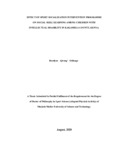| dc.contributor.author | Odiango, Roselyne Ajwang’ | |
| dc.date.accessioned | 2020-11-02T09:38:53Z | |
| dc.date.available | 2020-11-02T09:38:53Z | |
| dc.date.issued | 2020-08-24 | |
| dc.identifier.uri | http://r-library.mmust.ac.ke/123456789/1401 | |
| dc.description.abstract | Research consistently documents sports participation as promising for the promotion of social skill learning in children with intellectual disability. However, there exists limited evidence- based intervention research to confirm this research proposition. This study investigated the profile of social behaviour functioning levels in eight (8) children with intellectual disability aged 8-14 years who were exposed to an adapted protocol of a sport socialization intervention programme. The specific objectives of this study were to: (a) Establish the demographic characteristics of study participants (b) Determine the effect of a sport socialization intervention programme on social skill development, (c) Compare ratings of social behaviour levels across gender and (d) Compare adaptive behaviour levels of children with ID before and after the sport socialization intervention programme. The intervention involved instructing, prompting and cueing each child with ID into action. This study used a Single Subject design (SSD) quasi-experimental research. Data was collected at three weeks interval during pre-test and post-test after fourteen weeks of treatment. Data collection instruments were: a 3-5-minute video capture, Peer Social Task Rating Scale (PSTRS) and Adaptive Behavior Scale (ABS) checklist. Data was analysed descriptively, visual analysis, time series analysis and Null hypotheses tested by Statistical Process Control (SPC). Results were considered significant at >6 consecutive point runs above Upper Control Limit (UCL) of Statistical Process Control (SPC)/-+3SD. The overall findings of this study showed all children had an identifiable mild to moderate intellectual disability, similarly parents/guardians who accompanied children were females. All the children had lower social skill functioning at pre-test compared to post-test and skills learnt were generalizable. Gender did not affect social behaviour learning. All Children improved in pro-social aspects of adaptive behaviour functioning with YAMY 3, at 21.4%, YAKS 4 at 28.6%, YAKS 5 at 10%, YAKS 6 at 42.8%, YARO 7 at 21.4%, YARO 8 at 35.7% and YARO 9 at 14.3%. Null hypothesis that expected no significant difference on child’s learning of social skill and adaptive behaviour after intervention was rejected. Although Yaks 5 registered non-significant performance after fourteen weeks intervention, there was improvement from pretest raw scores of negative social strategies towards positive social behaviour functioning at posttest. The study concluded that majority of caregivers were grandparents, the intervention programme had significant effect on social behaviour. Intervention also improved social behaviour irrespective of gender. Pro-social skills of adaptive behaviour learning of children with ID were enhanced. The study recommends that parents should allow their child with ID to play with typically developing peers in their neighbourhoods to develop social behaviour(s). Promotion of parents/caregivers involvement in their children’s learning, both boys and girls should be given opportunities to learn skills. Promote school health promotion programmes to enhance adaptive behaviour functioning in the county. This study recommends for further research on: impact of parental socio-economic factor on social behaviour levels of their children, replication of study on other disability classifications (Children with Autism and Cerebral Palsy who may experiencing similar social skill deficits. Study should be replicated in other counties to benefit other children with ID not covered by the study. | en_US |
| dc.description.sponsorship | MMUST | en_US |
| dc.language.iso | en | en_US |
| dc.publisher | MMUST | en_US |
| dc.subject | Effects, Sport Socialization, Intervention, Programme,Social, Skill, learning, Children, Intellectual,Disabilities. | en_US |
| dc.title | EFFECT OF SPORT SOCIALIZATION INTERVENTION PROGRAMME ON SOCIAL SKILL LEARNING AMONG CHILDREN WITH INTELLECTUAL DISABILITY IN KAKAMEGA COUNTY, KENYA. | en_US |
| dc.type | Thesis | en_US |

